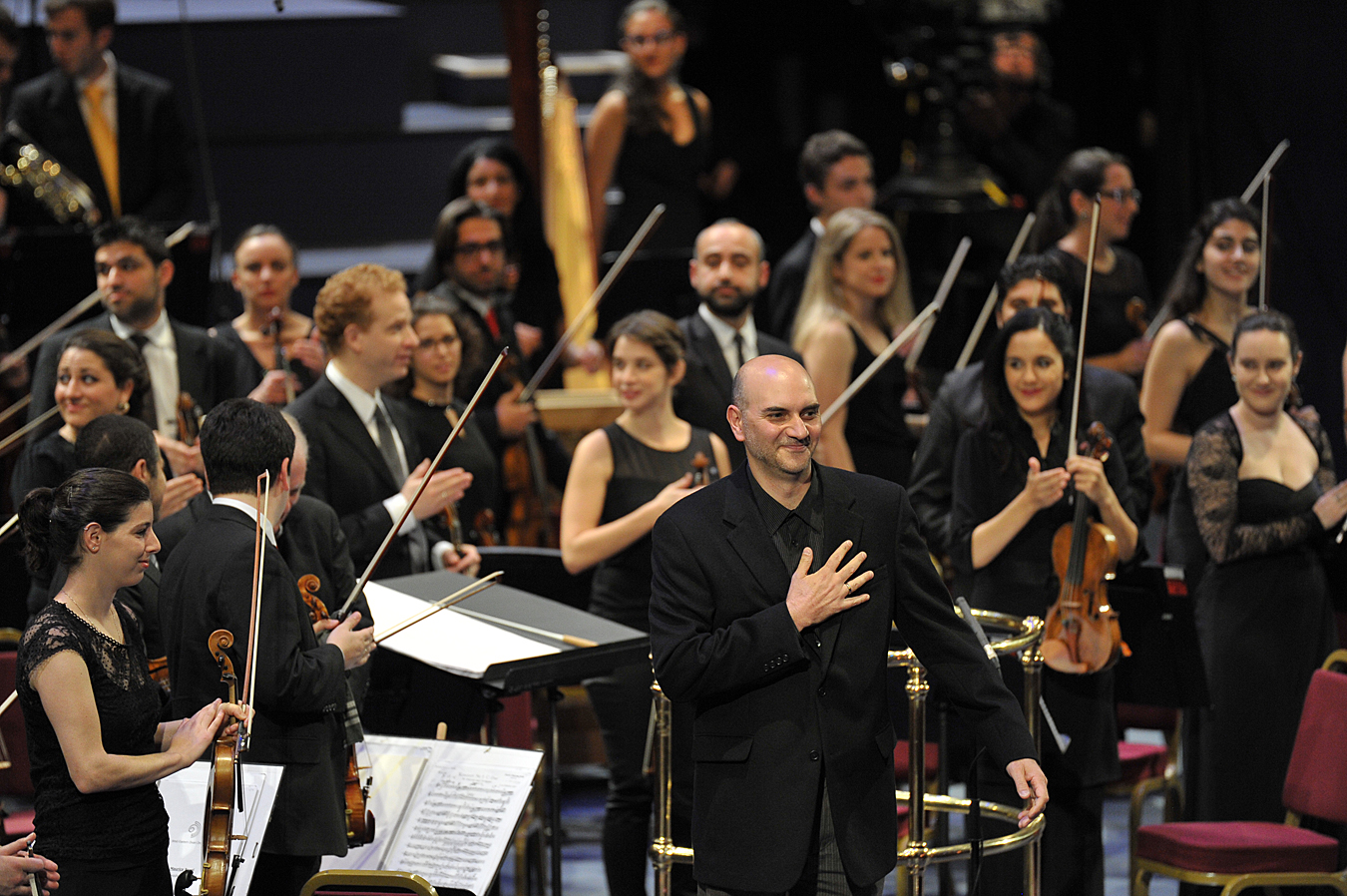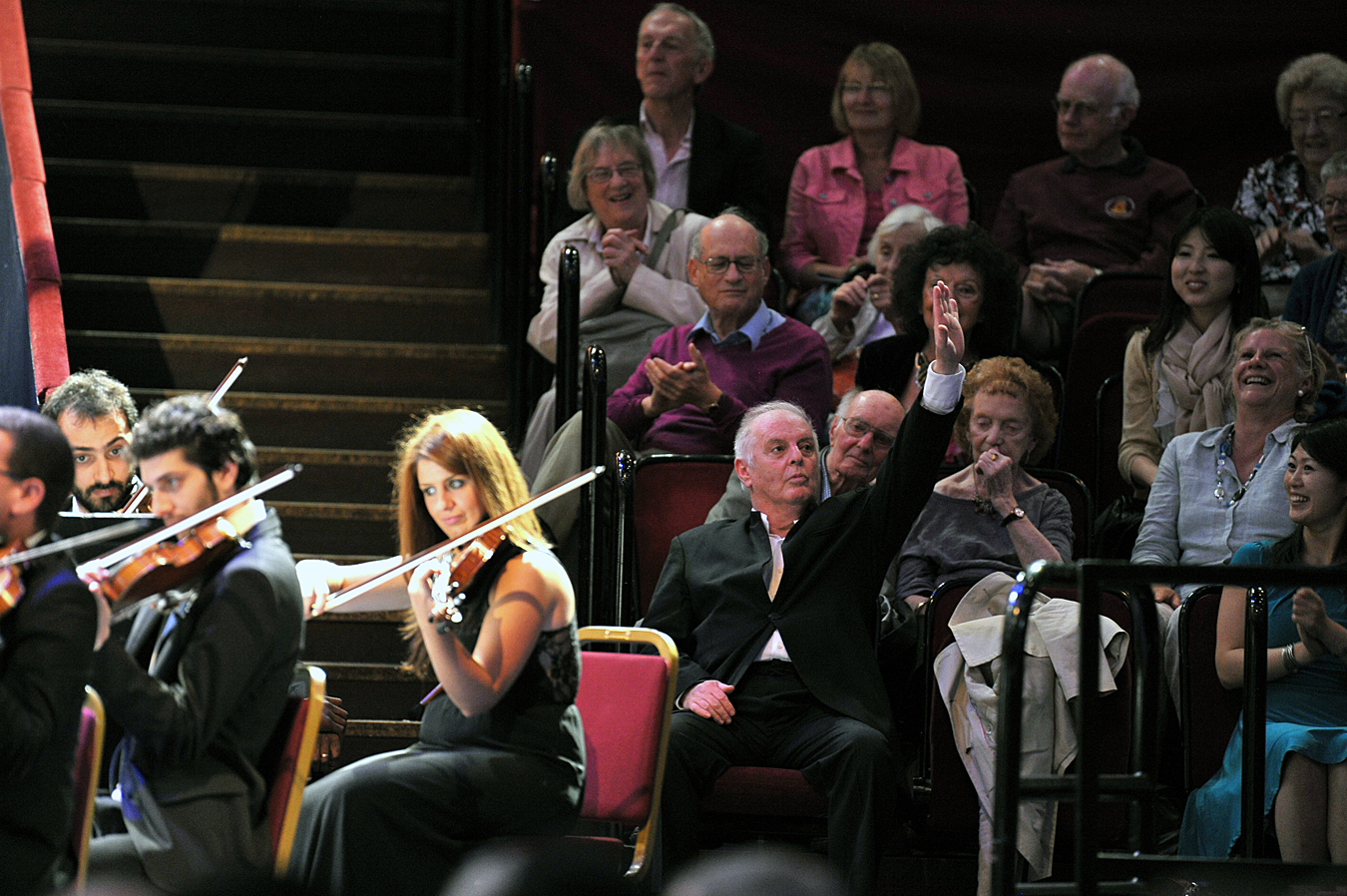Prom 46: West-Eastern Divan Orchestra, Barenboim | reviews, news & interviews
Prom 46: West-Eastern Divan Orchestra, Barenboim
Prom 46: West-Eastern Divan Orchestra, Barenboim
Subtle touches but too little passionate abandon in this fine team's lopsided programme
By the time we got to the end of this Prom, with four of the five encores – the whole of Bizet’s Carmen Suite – cannily crafted to bolster the short official programme, most of the rightly euphoric audience had forgotten the most unsatisfying first half so far this season. Perhaps I start from an ungenerous standpoint.
It’s always a wonderful thing to see youth at the Proms, which means a younger audience in parts of the hall, too. But the music-making has to stand by itself, and once we’d applauded the enterprise, only treasurable stretches of this evening matched up to the perfect communication of the European Union Youth Orchestra’s Prom – unsurpassable in any case – and the National Youth Orchestra spectacular last week.

Good for history, then, but not for music itself, at least in Adler’s case. When does an orchestra decide to bin what it’s commissioned? Presumably you're familiar with the composer when you ask him or her to write a piece. On this evidence, Adler has none of the individuality effusively claimed in his programme biography. Within seconds of Resonating Sounds, you know by the indiscriminate use of six percussionists that this is going to be a new piece like a thousand others: shapeless, rhythmically inert, without thematic hooks, engaging a large orchestra with big swooshes of sound just because it’s there: all textures - cueing the ubiquitous word ‘soundworld’, but not an interesting one at that - and no foreground.
Roustom’s Ramal, based both title-wise and musically on a pre-Islamic Arabic poetic metre, at least grabs you at the start, a John Adams takeoff that doesn’t subsequently give you that composer’s sense of moving through space. It’s an audience-pleasing collage of film-music – one of Roustom’s many disciplines, another being string arrangements for Beyoncé and Shakira – and familiar echoes of good role-models: minutes after a moment of stasis with beautifully-scored wind chords promising a main event that doesn’t quite happen, there’s a not inappropriate chant of Brittenesque angst. But even in 12 minutes, I wasn’t sure where the piece was going.
Outstanding solo star of the evening among many, achingly characterful, turned out to be the first bassoon
Trust Ravel to show the real novelty of less-is-more orchestration. Barenboim chose a Spanish symphony in seven movements, perhaps a homage to the orchestra’s annual summer gathering in Seville. The subtle moments were the best: this conductor has always said that in this space you bring an audience in to catch the near-inaudible, rather than straining to reach out, and though the Spanish night at the opening of the Rapsodie espagnole had things that went bump in it from a restless audience, the flurries of clarinets and bassoons were haunting indeed; the outstanding solo star of the evening among many, achingly characterful in the central song of the Alborada del gracioso, turned out to be the first bassoon, though I can’t give her name since none of the players was listed in the programme (security measure?).
Just as fine, if less in the spotlight, was the first horn, kicking off the real highlight of the evening for me, the Pavane pour une infante défunte phrased with infinite sensitivity. A lament for dead children was the one point in the evening where some of us cast sideways to the ongoing conflict and shed a few tears..

Not enough, then, of the full-throttle intensity we’d had from, say, the Borusan Istanbul Philharmonic earlier in the season (and they couched their first-half dud in finer company). But the encores were beautifully done and the Carmen Prelude, presented last of the Bizet four, allowed Barenboim to set aside his baton for the second time after Boléro’s opening string of solos. A little Argentinian tango, postcard from the orchestra’s recent tour there and deftly arranged for brass, wind and percussion, tasted sweet but seemed totemic of the concert as a whole: a passion-low zone.
- Listen to this concert for the next month on the BBC Radio 3 iPlayer
- Highlights to be shown on BBC Radio Four on 29 August
rating
Explore topics
Share this article
The future of Arts Journalism
You can stop theartsdesk.com closing!
We urgently need financing to survive. Our fundraising drive has thus far raised £33,000 but we need to reach £100,000 or we will be forced to close. Please contribute here: https://gofund.me/c3f6033d
And if you can forward this information to anyone who might assist, we’d be grateful.

Subscribe to theartsdesk.com
Thank you for continuing to read our work on theartsdesk.com. For unlimited access to every article in its entirety, including our archive of more than 15,000 pieces, we're asking for £5 per month or £40 per year. We feel it's a very good deal, and hope you do too.
To take a subscription now simply click here.
And if you're looking for that extra gift for a friend or family member, why not treat them to a theartsdesk.com gift subscription?
more Classical music
 St Matthew Passion, Irish Baroque Orchestra, Whelan, St Patrick’s Cathedral, Dublin review - the heights rescaled
Helen Charlston and Nicholas Mulroy join the lineup in the best Bach anywhere
St Matthew Passion, Irish Baroque Orchestra, Whelan, St Patrick’s Cathedral, Dublin review - the heights rescaled
Helen Charlston and Nicholas Mulroy join the lineup in the best Bach anywhere
 Kraggerud, Irish Chamber Orchestra, RIAM Dublin review - stomping, dancing, magical Vivaldi plus
Norwegian violinist and composer gives a perfect programme with vivacious accomplices
Kraggerud, Irish Chamber Orchestra, RIAM Dublin review - stomping, dancing, magical Vivaldi plus
Norwegian violinist and composer gives a perfect programme with vivacious accomplices
 Small, Hallé, Wong, Bridgewater Hall, Manchester review - return to Shostakovich’s ambiguous triumphalism
Illumination from a conductor with his own signature
Small, Hallé, Wong, Bridgewater Hall, Manchester review - return to Shostakovich’s ambiguous triumphalism
Illumination from a conductor with his own signature
 LSO, Noseda, Barbican review - Half Six shake-up
Principal guest conductor is adrenalin-charged in presentation of a Prokofiev monster
LSO, Noseda, Barbican review - Half Six shake-up
Principal guest conductor is adrenalin-charged in presentation of a Prokofiev monster
 Frang, LPO, Jurowski, RFH review - every beauty revealed
Schumann rarity equals Beethoven and Schubert in perfectly executed programme
Frang, LPO, Jurowski, RFH review - every beauty revealed
Schumann rarity equals Beethoven and Schubert in perfectly executed programme
 Levit, Sternath, Wigmore Hall review - pushing the boundaries in Prokofiev and Shostakovich
Master pianist shines the spotlight on star protégé in another unique programme
Levit, Sternath, Wigmore Hall review - pushing the boundaries in Prokofiev and Shostakovich
Master pianist shines the spotlight on star protégé in another unique programme
 Classical CDs: Big bands, beasts and birdcalls
Italian songs, Viennese chamber music and an enterprising guitar quartet
Classical CDs: Big bands, beasts and birdcalls
Italian songs, Viennese chamber music and an enterprising guitar quartet
 Connolly, BBC Philharmonic, Paterson, Bridgewater Hall, Manchester review - a journey through French splendours
Magic in lesser-known works of Duruflé and Chausson
Connolly, BBC Philharmonic, Paterson, Bridgewater Hall, Manchester review - a journey through French splendours
Magic in lesser-known works of Duruflé and Chausson
 Biss, National Symphony Orchestra, Kuokman, NCH Dublin review - full house goes wild for vivid epics
Passionate and precise playing of Brahms and Berlioz under a dancing master
Biss, National Symphony Orchestra, Kuokman, NCH Dublin review - full house goes wild for vivid epics
Passionate and precise playing of Brahms and Berlioz under a dancing master
 Verdi Requiem, Philharmonia, Muti, RFH review - new sparks from an old flame
Discoveries on a veteran maestro's epic journey
Verdi Requiem, Philharmonia, Muti, RFH review - new sparks from an old flame
Discoveries on a veteran maestro's epic journey
 Batsashvili, Hallé, Wong, Bridgewater Hall, Manchester review - a star in the piano universe
The Georgian pianist brings precision and freedom to Liszt’s warhorses
Batsashvili, Hallé, Wong, Bridgewater Hall, Manchester review - a star in the piano universe
The Georgian pianist brings precision and freedom to Liszt’s warhorses
 Naumov, SCO, Egarr, Queen's Hall, Edinburgh review - orchestral magic rescues some punishing music
Hard-driven Beethoven, monotonous Eötvös, some light from Kernis
Naumov, SCO, Egarr, Queen's Hall, Edinburgh review - orchestral magic rescues some punishing music
Hard-driven Beethoven, monotonous Eötvös, some light from Kernis

Add comment